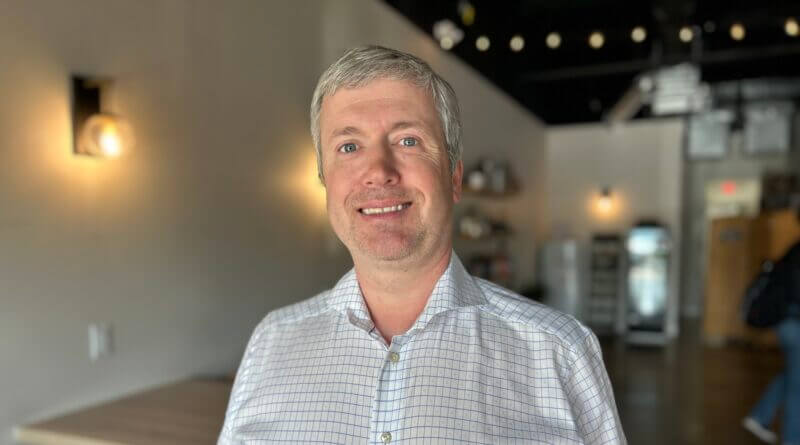McRae brings Unclaimed Money Tour to Southaven
Photo: Mississippi State Treasurer David McRae in Southaven on Thursday, Aug. 8. (Bob Bakken/desotocountynews.com)
Think you have some money coming to you? Like life insurance policy proceeds, utility deposits, refunds and such? Mississippi State Treasurer David McRae has been working to reunite Mississippians with their misplaced dollars and wants to do the same for you.
In just over four years, McRae’s office has been able to return a record-breaking $100 million in unclaimed money. With that accomplishment, McRae and representatives from his office are now in the middle of a statewide tour to celebrate that accomplishment while giving others a chance to see if they have money to find.
Thursday, the tour made a stop in Southaven to Coffee Central on Getwell Road, where for two hours they were available to check on possible missing money and then to start the process of recovery.
Another program McRae instituted, the Treasury’s Mississippi College and Career Savings program, had team members there to visit with families about saving for educational expenses.
We talked with McRae while in Southaven about the visit and what the Unclaimed Money program has been able to accomplish.
You’re in Southaven today on your Unclaimed Money tour. Can you talk a little bit about the purpose for doing this statewide trip?
“In early July, we hit $100 million given back to the people in Mississippi. We’ve done that in four and a half years. It’s a record and we’re excited about that. So, we wanted to travel around the state to spread the good news and celebrate that, but also give out more money to people who have money in the unclaimed money department.”
So how can Mississippi people learn about unclaimed money? How can they go about the process of finding out if they have anything?
“You can go to treasury.ms.gov, go to the Unclaimed Money section, type your name, your business name, relative or whatever you want to type in. It will pop up if you have any money. And from there, you can claim it. We’ve gotten rid of the notary process, and you can still do it by paper or you can do it through the E-file and we can get it back to you as soon as we possibly can.”
What do you find are the typical types of funds that have been, for lack of a better term, left behind?
“It’s a lot of deposits, like gas utilities, really any kind of deposits you put down. People move and someone can’t find you easily. We see those are the most common. We also have a lot of life insurance policies that people haven’t found all of that bank accounts, but it’s the utility deposits and when people move but those can be quite large.”
Can you remember or just briefly talk about maybe a couple of the larger finds that you have had?
“So last year we found two $800,000 life insurance policies for people that had been lost over time. We found a charity that just had a missed address. We found them $250,000, a charity down in Jackson. We found several people have $100,000 from just a life insurance policy. A man on Monday found $100,000 from a life insurance policy. Well several people have $250,000 from wills and estate probating. It’s just amazing what people find that they’ve lost over time or the address got wrong or people just didn’t know where to find them. So if people go to the website and they’ll see that they’ll have over $200 or under $200 they may not think it’s not much. But the average claim is roughly $2,000 and one and 10 Mississippians actually have found money.”
Is there a tax liability with this money?
Nope, it’s tax free. We pay you the interest if it’s gained any interest. We pay you that tax free, and it comes to you.
You also have people here with the College and Career savings program. Briefly talking about that.
“We have here today a College and Career Savings individual, our 529 prepaid programs, which I think are the best investment you can make in a young adult child’s life, period. We’re trying to get children or young adults to college without having to pay debt and I believe this is a fiscal conservative way to do that. If you do the prepaid option, it locks you into what college costs today. Just recently, all the colleges raised their tuition, so if you had locked it in at a cheaper rate, you wouldn’t be having to pay that higher tuition come this next semester. It is a great way for not only that, but we’re pushing the career savings part. We’re seeing more and more people going into vocational training, two year colleges, or learning a trade. We’re seeing the average, for a nurse practitioner making $60,000. A dental hygienist is making upwards or higher than $90,000. These are great jobs and just as you go to a vocational two-year college, you’re making money and you can go back to a four year college after that without debt. The average child roughly graduates with $32,000 worth of college debt and this is a way we can stop that.”






